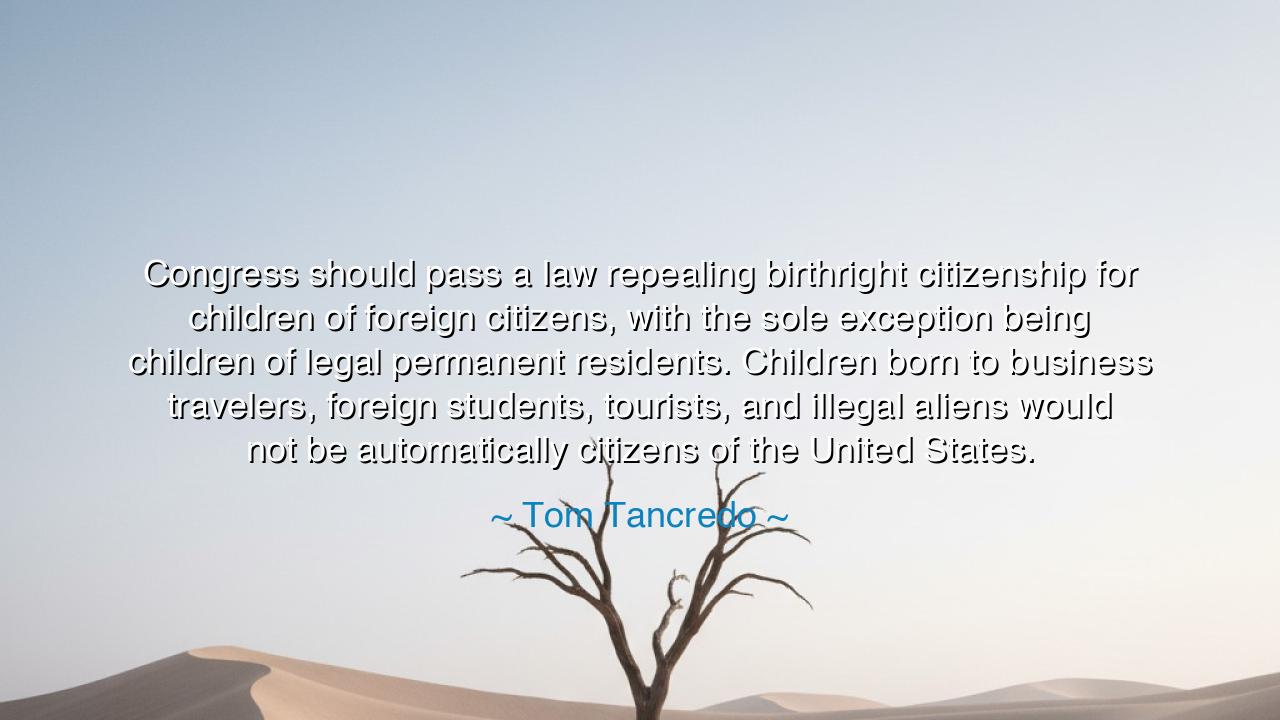
Congress should pass a law repealing birthright citizenship for
Congress should pass a law repealing birthright citizenship for children of foreign citizens, with the sole exception being children of legal permanent residents. Children born to business travelers, foreign students, tourists, and illegal aliens would not be automatically citizens of the United States.






The words of Tom Tancredo, spoken with the fire of controversy and conviction, pierce into one of the most ancient and enduring debates of nations: “Congress should pass a law repealing birthright citizenship for children of foreign citizens, with the sole exception being children of legal permanent residents. Children born to business travelers, foreign students, tourists, and illegal aliens would not be automatically citizens of the United States.” This is not merely a statement about law; it is a reflection on belonging, on the rights of birth, and on the boundary between inclusion and exclusion. It confronts the very question: What does it mean to be of a land?
At the heart of his words lies the challenge to birthright citizenship itself, a principle enshrined in the 14th Amendment after the Civil War. That amendment was born from blood and sacrifice, meant to secure citizenship for freed slaves and their children, declaring that those born on American soil were Americans by right, not subject to the shifting tides of prejudice. Tancredo’s statement questions whether this principle, forged in one age, still serves in another, where global travel and immigration have transformed the landscape of the nation. His vision restricts citizenship, tying it not to the accident of place, but to the permanence of legal status.
History offers us echoes of this tension. In ancient Athens, citizenship was not granted to all born within its walls, but only to those whose parents were both Athenians. This narrowness preserved identity but also sowed division, for many who lived, worked, and fought for the city remained forever excluded. In contrast, Rome, at first jealous of its citizenship, expanded it over centuries until it embraced peoples across its empire, binding diverse lands together under one law. Rome’s greatness was in part born from this inclusivity, even as its burdens grew heavy. Thus, the question Tancredo raises is as old as civilization: shall nations protect their identity through restriction, or expand it through inclusion?
His words also reveal a profound anxiety: the fear that illegality and impermanence may erode the meaning of citizenship. To him, the child of a tourist or of one who entered without permission does not bear the same claim to the nation as the child of one who has pledged themselves to permanence and law. This fear is not without precedent, for every nation struggles with the tension between welcoming the stranger and preserving the order of its house. Yet the danger in such restriction is that it may wound the very spirit of equality, dividing children by the circumstances of their parents, a matter over which they have no control.
The origin of his call lies in the politics of modern America, where immigration has become a lightning-rod issue, shaping elections and dividing communities. His proposal reflects not only personal conviction, but the broader movement of those who seek to redefine belonging more narrowly, to protect what they see as the integrity of the nation. It is both a political strategy and a moral declaration, for it claims that not all births are equal, that the soil itself does not grant identity, but only the recognition of law.
From this arises a lesson both cautionary and profound: laws of citizenship are not merely legal constructs, but mirrors of a nation’s soul. To change them is to redefine who is “us” and who is “them.” Such choices must be made not in fear or anger, but in wisdom and justice. For the power to exclude is great, but the cost of exclusion is heavy—leaving behind those who, though born under the same sky, are told they do not belong.
Therefore, children of tomorrow, reflect deeply on these words. Ask yourselves: what kind of nation do you wish to build? One that guards its gates so tightly that even the innocent are turned away, or one that risks openness in order to grow in diversity and strength? Neither path is without peril. But know this: the measure of a people lies not only in whom they protect, but in whom they choose to embrace. Weigh carefully the balance between law and compassion, between security and justice. For in that balance lies the destiny of nations, and the inheritance of generations yet to be born.






AAdministratorAdministrator
Welcome, honored guests. Please leave a comment, we will respond soon